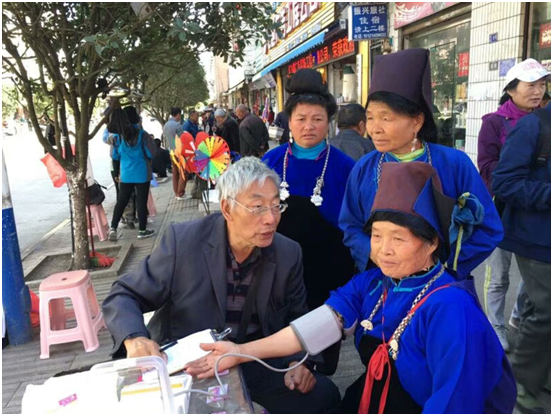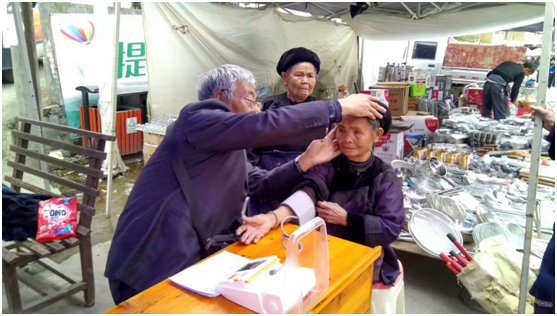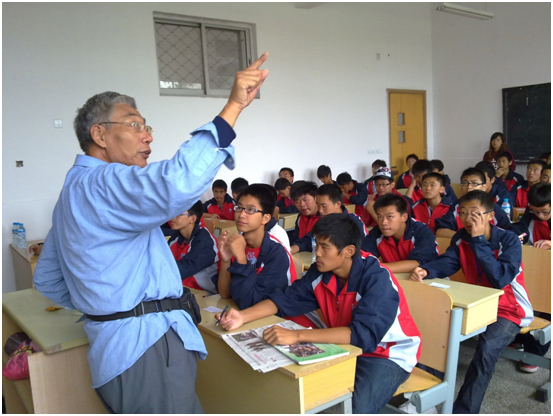
Zheng Lianbin (left), a professor with the College of Life Science at Tianjin Normal University, collects physical data from a member of the Shui ethnic group in Qiannan prefecture, Southwest China's Guizhou province, in 2018. [Provided to chinadaily.com.cn]
The research results on the biological data of 14 of China's unrecognized ethnic groups, the first study of its kind, will be published by China Science Publishing & Media Ltd later this year.
The country's top anthropologist, Zheng Lianbin, 72, a professor with the College of Life Science at Tianjin Normal University, led the study and said that the research focuses on rare data from 14 unrecognized ethnic groups, including the Kongge, Bajia and Sherpa.
The study began in 2014 and was completed last year, and the team has now shifted its investigation to focus on other unrecognized ethnic groups.
According to statistics from the country's sixth population censusin 2010 released by the National Bureau of Statistics, China had a population of more than 600,000 who belong to some 20 unrecognized ethnic groups, mostly living in the remote areas of Southwest China.
The term "unrecognized ethnic groups" refers to ethnic groups that are not included among China's conventionally recognized 56 ethnic groups. The Han people are China's largest ethnic group, making up 90 percent of the country's total population of 1.3 billion.

Zheng Lianbin (left), a professor with the College of Life Science at Tianjin Normal University, with people from the Miao ethnic group in 2018 in Danzhai county, in Southwest China's Guizhou province. [Provided to chinadaily.com.cn]
The seventh pollution census, which began last year, is underway, and the exact population of the unrecognized ethnic groups has not yet been released. However, the number is expected to increase from the figure in 2010.
Zheng's research is ahead of the government's nationwide investigation and could provide reliable information for the country, the insiders noted.
"Some of the ethnic people indicated that it's the first time for their group to be covered in the statistics," he said.
Due to his 40-year-commitment to the study of physical anthropology, Zheng was honored with the Lifetime Achievement Award in late 2020 during the annual meeting of the Shanghai Anthropology Association.
Zheng and his team have helped the country to fill in physical data gaps on 39 ethnic groups and provided valuable data related to disease prevention, the migration routes of ethnic peoples and crime information, among other statistics.
"In the 1980s, most Western countries completed their studies on the biological data of their ethnic groups. Our country lagged, though, with weak study strength and a shortage of data," said Zheng, recalling the reason he began his research as early as 1981.

Zheng Lianbin (left), a professor with the College of Life Science at Tianjin Normal University, measures the head circumference of a senior citizen of the Buyi ethnic group in Qiannan prefecture, Southwest China's Guizhou province, in 2018. [Provided to chinadaily.com.cn]
To date, he and his team have collected 4 million pieces of data from 60,000 people around the country, and they have founded the country's most extensive database for physical development data and features of the different groups.
Zheng's team's biological research on the Han and Mongolian ethnic groups were the earliest of their kind in China.
From 2009-2013, Zheng and his 10 team members launched the country's most extensive biological research study of its majority Han ethnic group.
The study focused on different areas in 22 provinces throughout China, instead of basing its research on large immigration cities like Beijing and Shanghai.
Zheng's research on the Mongolian people was recognized as outstanding in the international academic circle.
He noted that committed efforts should be made to investigate the origins of diverse tribes of the Mongolian ethnic group in China. His studies also accomplished the first-ever research on the group's biological data.

Zheng Lianbin (left), a professor with the College of Life Science at Tianjin Normal University, gives a lecture on human genetics at a medical college in Huaiyin, East China's Jiangsu province, in 2010. [Provided to chinadaily.com.cn]
His study on the Uygur ethnic group concluded that previous Western studies that asserted the ethnic group originated in Central Asia were wrong. His research found evidence that the Uygur ethnic group is clearly from China.
Du Ruofu, 90, a leading expert at the Genetics and Development Biology Department at the Chinese Academy of Sciences, indicated that Zheng's research has helped fill in gaps in the country's knowledge of its various peoples.
"Part of my lifelong career dream was to find an answer to the origin of the Uygur ethnic group, and Zheng accomplished my dream," Du said.
来源:2020年1月6日 中国日报
链接:https://www.chinadaily.com.cn/a/202101/06/WS5ff563fba31024ad0baa0dfa.html